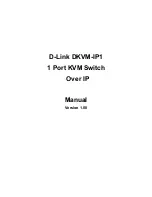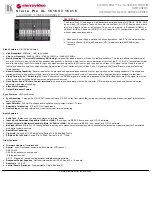
INS_CWGE10FX2TX8MSPOE 02/19/21 PAGE 109
INSTALLATION AND OPERATION MANUAL
CWGE10FX2TX8MSPOE
TECH SUPPORT: 1.888.678.9427
Spanning Tree Protocols (STP/RSTP)
(R)STP detects and breaks network loops and provides backup links between switches, bridges
or routers. It allows a Switch to interact with other (R)STP compliant switches in your network to
ensure that only one path exists between any two stations on the network.
The Switch supports Spanning Tree Protocol (STP) and Rapid Spanning Tree Protocol (RSTP) as
defined in the following standards.
»
IEEE 802.1D Spanning Tree Protocol
»
IEEE 802.1w Rapid Spanning Tree Protocol
The Switch uses IEEE 802.1w RSTP (Rapid Spanning Tree Protocol) that allows faster convergence
of the spanning tree than STP (while also being backwards compatible with STP-only aware
bridges). In RSTP, topology change information is directly propagated throughout the network
from the device that generates the topology change. In STP, a longer delay is required as the
device that causes a topology change first notifies the root bridge and then the root bridge
notifies the network. Both RSTP and STP flush unwanted learned addresses from the filtering
database.
In STP, the port states are Blocking, Listening, Learning, Forwarding.
In RSTP, the port states are Discarding, Learning, and Forwarding.
Note: In this document, “STP” refers to both STP and RSTP.
STP Terminology
»
The root bridge is the base of the spanning tree.
»
Path cost is the cost of transmitting a frame onto a LAN through that port. The recommended
cost is assigned according to the speed of the link to which a port is attached. The slower the
media, the higher the cost.
»
On each bridge, the bridge communicates with the root through the root port. The root port
is the port on this Switch with the lowest path cost to the root (the root path cost). If there is no
root port, then this Switch has been accepted as the root bridge of the spanning tree network.
»
For each LAN segment, a designated bridge is selected. This bridge has the lowest cost to the
root among the bridges connected to the LAN.
















































